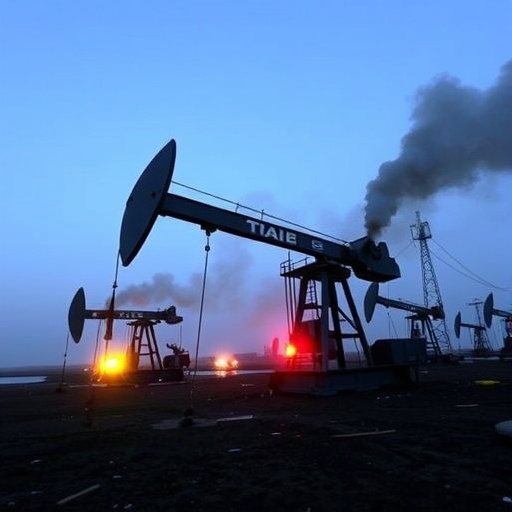Allies Vow to Wipe Russian Oil Off Global Markets in Escalating Ukraine Support Push
In a dramatic escalation of economic pressure against Russia, UK Prime Minister Sir Keir Starmer announced on Thursday that a powerful coalition of Western allies has committed to a comprehensive plan to remove Russian oil and gas from the global market entirely. This bold initiative, unveiled during a high-level summit in London, targets the heart of Moscow’s war economy amid the protracted conflict in Ukraine, aiming to starve the Kremlin’s military funding by curtailing its most lucrative export.
- Starmer’s Summit Revelation: Forging a United Front Against Russian Energy Dominance
- Striking at the Source: Oil Sanctions’ Direct Assault on Russia’s War-Fueled Economy
- Navigating Energy Turbulence: Allies’ Strategies for Securing Alternative Supplies
- Global Echoes: Stakeholder Reactions and the Human Cost in Ukraine
The announcement comes as Ukraine enters its third year under relentless Russian aggression, with allies seeking fresh mechanisms to enforce oil sanctions more rigorously. Starmer emphasized that this unified front—encompassing the United States, European Union members, Canada, Japan, and others—represents a “decisive turning point” in supporting Kyiv’s defense while disrupting Russia‘s ability to sustain its invasion. “We cannot allow Putin’s war machine to run on the fuel of global indifference,” Starmer declared, underscoring the moral and strategic imperative behind the move.
Details of the plan include enhanced enforcement of price caps, expanded seizure of shadow fleet tankers evading sanctions, and coordinated diplomatic efforts to isolate Russian energy exports further. Economists estimate that Russia currently derives over 40% of its federal budget from oil and gas revenues, totaling around $300 billion annually before the war. By accelerating oil sanctions, allies hope to slash this figure by at least half, forcing Moscow to confront mounting fiscal pressures.
Starmer’s Summit Revelation: Forging a United Front Against Russian Energy Dominance
The London summit, attended by foreign ministers and energy secretaries from 20 nations, marked a pivotal moment in the international response to Russia’s invasion of Ukraine. Sir Keir Starmer, fresh from domestic political battles, positioned the UK as a leading voice in global diplomacy. In his opening address, he outlined the coalition’s roadmap: a phased elimination of Russian oil from key markets, starting with stricter compliance in Europe and Asia.
“Our allies have agreed that enough is enough,” Starmer stated, flanked by U.S. Secretary of State Antony Blinken and EU High Representative Josep Borrell. The plan builds on existing G7 measures, such as the $60 per barrel price cap imposed in December 2022, which has already reduced Russian oil revenues by an estimated 30%. However, enforcement gaps—exploited by Russia’s “shadow fleet” of uninsured tankers—have allowed Moscow to maintain sales above the cap, particularly to India and China.
To counter this, the coalition pledged $5 billion in joint funding for maritime patrols and intelligence sharing. NATO allies, including the UK and U.S., will deploy additional naval assets in the Baltic and Black Seas to intercept non-compliant shipments. “This isn’t just about sanctions; it’s about securing our collective future,” Blinken added, highlighting the synergy with military aid packages totaling over $100 billion since the war began.
Historical context underscores the urgency. Prior to the February 2022 invasion, Russia supplied 40% of Europe’s natural gas and 25% of its oil, creating dangerous dependencies. The EU’s rapid diversification—importing liquefied natural gas from the U.S. and Qatar—has reduced Russian gas imports by 80%, but oil remains a sticking point. Ukraine’s Foreign Minister Dmytro Kuleba, joining virtually, praised the initiative: “Every barrel of Russian oil denied is a bullet denied to the invaders.”
Striking at the Source: Oil Sanctions’ Direct Assault on Russia’s War-Fueled Economy
Russia’s economy, once buoyed by soaring energy prices post-invasion, now faces a perfect storm from intensified oil sanctions. The Kremlin has relied on fossil fuel exports to finance its Ukraine campaign, with military spending surging to 6% of GDP in 2023—equivalent to $109 billion. Oil alone generated $181 billion in 2022, but sanctions have eroded this lifeline, causing a 25% drop in export volumes to non-Western buyers.
Experts at the International Energy Agency (IEA) project that full implementation of the new plan could reduce Russia’s oil revenues by another $50 billion annually. This would exacerbate budget deficits, already at 1.9% of GDP, and force cuts to social programs or further military rationing. “Russia’s economy is a house of cards built on oil; these sanctions pull the foundation away,” said Jason Bordoff, founding director of Columbia University’s Center on Global Energy Policy.
The mechanics of oil sanctions are multifaceted. The G7’s price cap, enforced through Western insurance and shipping services, has forced Russia to discount its Urals crude by $20-30 per barrel below Brent benchmarks. Yet, Moscow’s pivot to Asian markets—exporting 90% of its seaborne oil to India and China—has sustained revenues. The coalition’s response includes secondary sanctions on entities facilitating these trades, such as Indian refiners and Chinese banks.
Ukraine’s role in this narrative is central. The war has devastated its energy infrastructure, with Russian strikes destroying 50% of thermal power capacity. Kyiv estimates that sustained oil sanctions could shorten the conflict by diverting Russian resources. “This is economic warfare that complements our battlefield efforts,” Ukrainian President Volodymyr Zelenskyy tweeted post-announcement, urging faster delivery of the promised measures.
Challenges abound, however. Russia’s state-owned Rosneft and Gazprom have adapted by using a fleet of 600 aging tankers, often reflagged to obscure origins. Allies plan to blacklist 100 such vessels in the coming months, potentially stranding 10% of Russia’s export capacity. Still, global oil prices could spike 5-10% short-term, testing public support in sanctioning nations amid inflation concerns.
Navigating Energy Turbulence: Allies’ Strategies for Securing Alternative Supplies
As allies move to exorcise Russian oil from global markets, the focus shifts to mitigating supply disruptions and accelerating the green transition. The EU, once Russia’s largest customer, has slashed imports by 92% since 2021 through aggressive diversification. U.S. LNG exports to Europe hit record 7.1 billion cubic feet per day in 2023, while Norway ramped up production by 10%.
This pivot extends to oil. Saudi Arabia and the UAE have increased output under OPEC+ deals, filling gaps with 500,000 barrels per day. The U.S., the world’s top producer at 13 million barrels daily, committed to exporting an additional 1 million barrels to allies. “We’re not just sanctioning; we’re building resilience,” EU Energy Commissioner Kadri Simson remarked, detailing a €10 billion fund for renewable infrastructure.
Ukraine benefits indirectly, as reduced Russian revenues could weaken aerial bombardments on its energy grid. The country aims to reconstruct with Western aid, targeting 10 gigawatts of new solar and wind capacity by 2025. Globally, the IEA forecasts that oil sanctions will hasten the energy transition, potentially cutting demand by 5 million barrels per day by 2030 through efficiency and electrification.
Yet, vulnerabilities persist. Developing nations like India, reliant on discounted Russian oil for 40% of imports, may resist full alignment. Diplomatic overtures, including U.S. offers of subsidized American crude, aim to sway them. In a broader list of commitments:
- Joint investments in African oil fields to boost non-Russian supply by 2 million barrels daily.
- Enhanced cybersecurity for energy grids, countering Russian hybrid threats.
- International tribunal preparations to seize frozen Russian assets—worth $300 billion—for Ukraine’s reconstruction.
These steps illustrate a holistic approach, blending immediate sanctions with long-term energy security.
Global Echoes: Stakeholder Reactions and the Human Cost in Ukraine
The pledge elicited a spectrum of reactions, from jubilant support in Kyiv to defiant bluster from Moscow. Russian Foreign Minister Sergey Lavrov dismissed the plan as “economic terrorism,” vowing retaliation through gas cutoffs to Europe—though pipelines like Nord Stream are already offline. President Vladimir Putin, in a rare public comment, claimed Russia’s economy grew 3.6% in 2023 despite sanctions, attributing it to “import substitution.” Independent analysts, however, warn of hidden strains, including a 20% ruble depreciation and capital flight exceeding $60 billion.
In Ukraine, the news landed as a morale booster. Residents in war-torn cities like Kharkiv, where Russian oil-funded missiles have razed homes, see it as validation of their endurance. “If this hits Putin’s wallet, it hits his war,” said Olena, a Kyiv teacher displaced by shelling, in interviews with BBC. Ukrainian economists project that sustained pressure could force Russia into negotiations, potentially averting further escalation.
Environmental groups hailed the move for curbing Arctic drilling in Russia’s Yamal region, which threatens indigenous communities and biodiversity. Amnesty International urged tying sanctions to humanitarian corridors for Ukraine’s 6 million refugees. Market watchers, per Bloomberg data, anticipate volatility: Brent crude rose 2% post-announcement, but long-term prices may stabilize as alternatives flood in.
U.S. Republicans, including Senate Minority Leader Mitch McConnell, endorsed the strategy but called for more domestic drilling to offset costs. In Asia, Japan’s Prime Minister Fumio Kishida affirmed commitment, despite energy import dependencies.
Looking forward, the coalition eyes quarterly reviews to adapt tactics, with potential expansions to Russian aluminum and diamonds. Success hinges on unity; fractures could embolden Moscow. For Ukraine, this economic siege offers hope that the tide is turning, paving the way for a durable peace and rebuilt energy sovereignty. As Starmer concluded, “The global market will no longer bankroll brutality.” The coming months will test whether words translate to weakened Russian resolve on the Ukrainian front.








